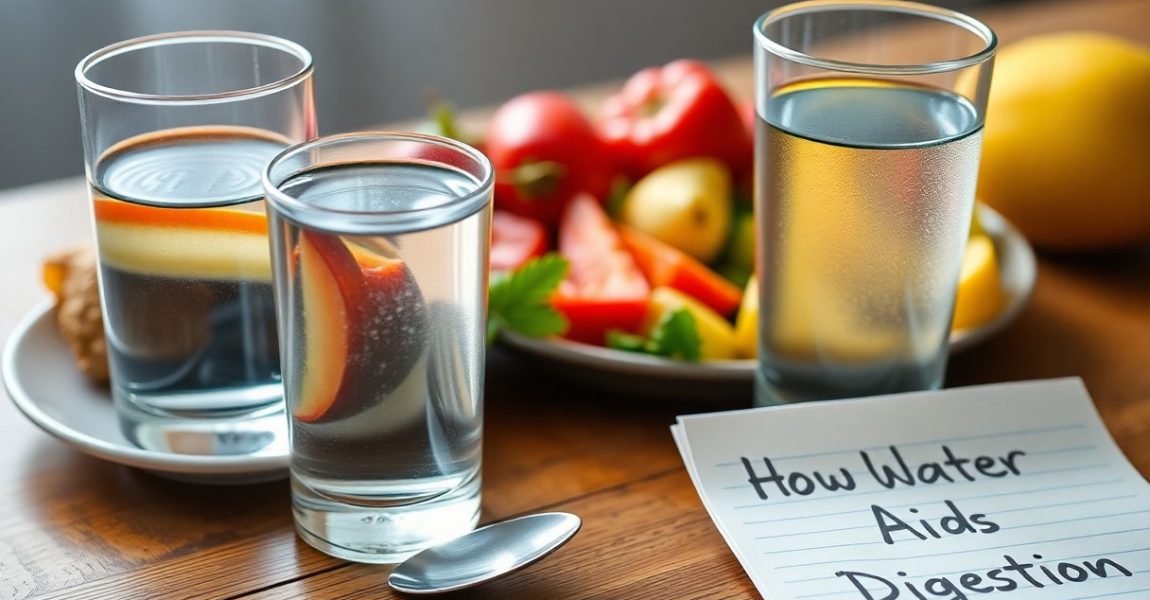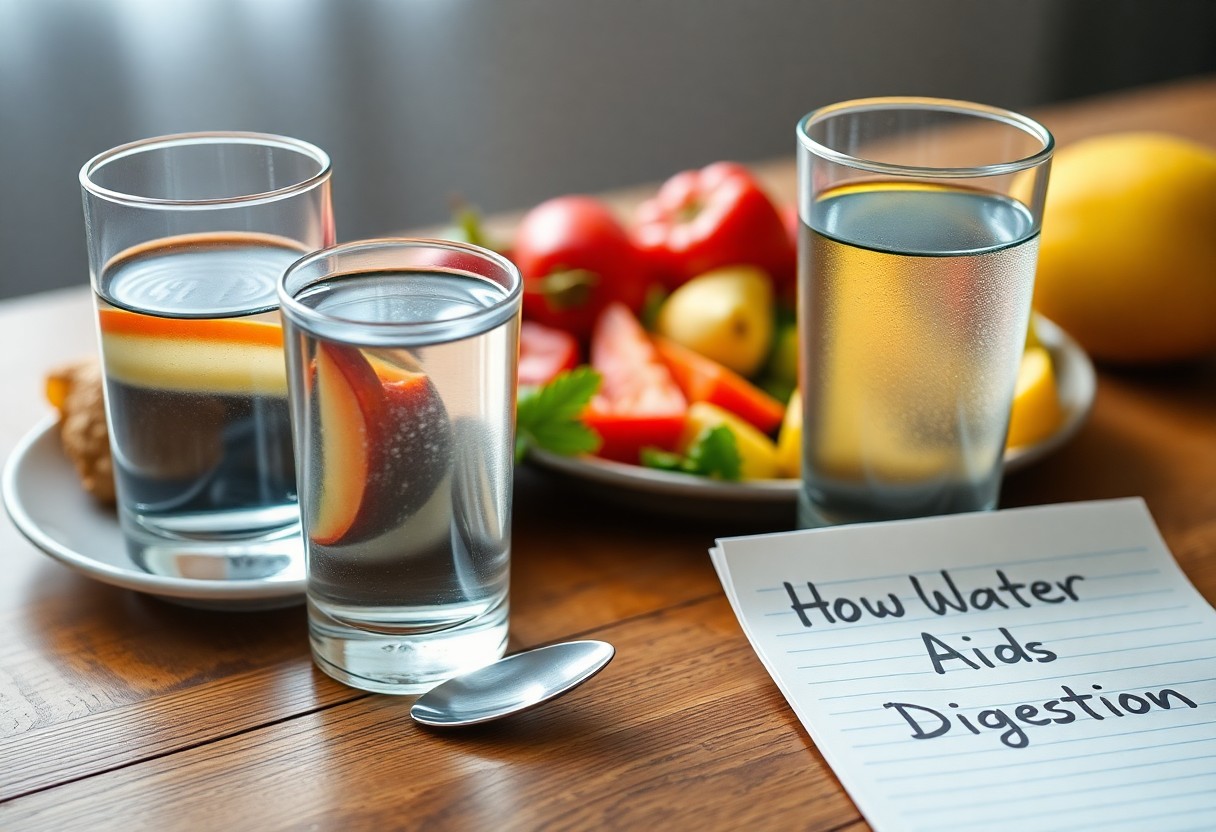
Health is greatly influenced by your hydration levels, especially when it comes to digestion. When you drink enough water, your body can break down food more effectively, allowing nutrients to be absorbed efficiently. Additionally, water helps prevent constipation by softening your stool, making it easier to pass. This simple habit can also reduce acid reflux and heartburn, contributing to an overall healthier digestive system. By prioritizing your water intake, you can significantly enhance your digestive health and well-being. Make digestion smoother with our hot & cold water dispenser — enjoy warm water to support metabolism or cold water to stay refreshed, all at the touch of a button

Contents
- 1 The Role of Hydration in Gastrointestinal Function
- 2 The Connection Between Water Consumption and Nutrient Absorption
- 3 The Effects of Dehydration on Digestive Health
- 4 Optimizing Water Intake for Digestive Efficiency
- 5 The Influence of Temperature and Water Quality on Digestion
- 6 Final Words
- 7 FAQ
- 7.0.1 Q: How does water aid in the digestion process?
- 7.0.2 Q: Can drinking water help prevent constipation?
- 7.0.3 Q: When is the best time to drink water for digestion?
- 7.0.4 Q: Does the temperature of the water matter for digestion?
- 7.0.5 Q: How much water should be consumed to support good digestion?
Key Takeaways:
- Water aids in breaking down food, making nutrients more accessible for absorption in the digestive system.
- It helps to dissolve soluble fiber, which promotes healthy bowel movements and prevents constipation.
- Drinking enough water can help mitigate digestive issues such as acidity and bloating.
- Hydration can enhance the production of saliva and digestive juices, improving overall digestion efficiency.
- Consistent water intake supports a balanced gut microbiome, which plays a significant role in digestion and overall health.
The Role of Hydration in Gastrointestinal Function
Water as a lubricant in digestion
Water acts as a natural lubricant in your digestive system, facilitating the smooth movement of food through your gastrointestinal tract. Saliva, which comprises about 99% water, plays a pivotal role right from the moment you take that first bite. As you chew, saliva not only moistens the food, making it easier to swallow, but it also contains digestive enzymes that kick-start the process of breaking down carbohydrates. If you’re not adequately hydrated, this vital first step becomes less efficient, potentially leading to discomfort and a slower digestion process.
Once food enters your stomach, water continues to assist by mixing with gastric juices to form chyme, the semi-liquid substance that moves into the small intestine. Adequate water intake can prevent the development of hard stools, which can be a painful result of dehydration. The presence of sufficient fluid is crucial for maintaining the right consistency of stool and promoting regular bowel movements, thus preventing constipation. Boost your digestion naturally with our 250ml mineral water — the perfect on-the-go size to keep your digestive system hydrated and working smoothly anytime, anywhere
The impact of hydration on stomach acid levels
Hydration levels significantly influence the production and composition of stomach acid. Your stomach secretes hydrochloric acid, which is vital for digesting food and killing harmful bacteria. Inadequate water intake can lead to a decrease in hydrochloric acid production, resulting in an imbalanced digestive environment that may hinder proper nutrient absorption. You might find that hydration can also affect how efficiently your stomach can break down proteins, leading to various digestive issues.
Studies suggest that a well-hydrated body maintains optimal gastric pH levels, supporting the enzymatic processes that occur during digestion. Conversely, dehydration may manifest as acidity or heartburn, as your stomach works harder to produce more acid without sufficient fluids. Ensuring you drink enough water can help mitigate these risks while supporting the overall efficiency of your digestive system.
The Connection Between Water Consumption and Nutrient Absorption
How water aids in breaking down food
Your body relies on water to effectively break down the food you consume. As you eat, water is necessary for dissolving nutrients and breaking down large food particles into smaller, more manageable forms. Enzymes in your saliva begin this process right away, but without adequate water intake, these enzymes may struggle to perform optimally. For example, fibrous foods like vegetables and grains require more water to soften and digest compared to simpler carbohydrates. This means that staying hydrated supports a smoother transition of food from your stomach to your intestines, allowing for greater nutrient availability.
The effect of water on digestion also extends to the stomach, where gastric juices are generated. These juices, composed of hydrochloric acid and digestive enzymes, thrive in a well-hydrated environment. If you deprive your body of water, the *digestive process may slow*, potentially leading to symptoms such as bloating or indigestion. A consistent intake of water helps maintain the right balance of acidity in the stomach, promoting optimal digestive health.
The importance of water for transporting nutrients
Once your food is broken down, water takes on the vital role of transporting nutrients throughout your body. Nutrient absorption primarily occurs in the small intestine, where digested food particles are carried away by the presence of water. This transportation system also ensures that vital vitamins and minerals, which are soluble in water, reach the cells that depend on them. For instance, when consuming fruits like oranges or watermelons, their high water content not only aids in digestion but enhances the delivery of nutrients like vitamin C and potassium into your bloodstream.
Additionally, adequate hydration prevents an overload of waste and toxins in your digestive system. When you’re hydrated, your body can efficiently filter and eliminate these unwanted substances, ultimately enhancing your overall absorption capability. As a result, staying hydrated isn’t just about drinking water; it’s about ensuring your body’s transportation and absorption systems are working in sync for optimal health.
The Effects of Dehydration on Digestive Health
Dehydration significantly impacts your digestive health, disrupting multiple processes that are imperative for maintaining overall well-being. When your body lacks adequate hydration, it compromises the production of imperative digestive fluids, which can lead to a range of complications including poor digestion and nutrient absorption. Studies indicate that even mild dehydration can impair gastrointestinal motility and lead to sluggish bowel movements. Over time, this can result in increased levels of discomfort and may even contribute to chronic digestive issues.
Constipation and its relationship with water intake
One of the most common digestive issues linked with dehydration is constipation. When you don’t drink enough water, your intestines absorb more water from the waste material that passes through them, leading to hard, dry stools that are difficult to pass. A well-hydrated body ensures that the stool remains soft and pliable, easing the process of elimination. The recommended daily water intake varies, but experts suggest aiming for at least eight 8-ounce glasses of water daily to promote healthy bowel movements and prevent constipation.
Inadequate fluid intake can turn everyday bowel movements into a struggle. If you’re prone to constipation, making a conscious effort to increase your water consumption could promote significant improvements in your digestive health. Including fiber-rich foods along with proper hydration can further enhance digestive function, forming a synergy that supports regularity while alleviating discomfort.
The risk of gastrointestinal disorders
The risks associated with dehydration extend beyond occasional constipation and can encompass a range of gastrointestinal disorders. Insufficient water intake has been linked to conditions such as irritable bowel syndrome (IBS) and gastritis. The gut requires a delicate balance of fluids to function properly; without adequate hydration, detrimental bacteria can flourish, exacerbating symptoms and further complicating your digestive health.
Chronic dehydration can lead to more than just discomfort; it may also contribute to serious long-term complications. Your gut’s microbiome thrives on balance, and hydration plays a key role in maintaining that equilibrium. By ensuring you drink enough water, you keep your digestive system operating optimally, minimizing your risk of developing gastrointestinal disorders while promoting overall health.
Optimizing Water Intake for Digestive Efficiency
Recommended Daily Water Intake for Digestive Health
The general guideline for daily water intake often falls around 2 to 3 liters depending on individual factors such as body weight, activity level, and climate conditions. For optimal digestive health, adequate hydration is especially key; studies have shown that even mild dehydration can slow down digestion, leading to uncomfortable symptoms like bloating and constipation. Tailoring your water consumption to meet personal needs—such as drinking more if you’re physically active or living in a warm environment—ensures that your digestive system remains functioning at its best.
To make hydration more effective for digestion, integrate water throughout your day rather than consuming it all at once. Carrying a water bottle can help you keep track of intake, aiming for a certain number of refills to reach your daily goal. Additionally, pairing water with meals can enhance the digestive process, as it aids in breaking down food and preparing it for absorption.
Timing and Methods for Optimal Water Consumption
Strategic timing of your water consumption can significantly impact digestion. Drinking a glass of water about 30 minutes before a meal can prime your stomach for food, whereas sipping water during meals may assist in digestion by mixing with food, making it easier to process. However, overloading your system with large amounts of water during a meal can dilute enzymes, potentially leading to slower digestion.
Finding the right rhythm works wonders; consider maintaining a pattern where you drink throughout the day instead of waiting until you’re thirsty. Thirst is often a sign that your body is already slightly dehydrated, so regular sips can prevent this. Additionally, herbal teas or infused waters can add variety and flavor, helping you stay hydrated without boredom, while still offering digestive benefits due to added herbs like ginger or mint.
Mixing up your hydration methods can also combat digestive discomfort. For instance, starting your day with warm water can stimulate digestion and help flush out toxins, while cold water might feel refreshing, especially during exercise. Be attentive to how your body responds to different methods of hydration, as everyone’s digestive system reacts uniquely, making it necessary to adjust your drinking habits to find what keeps you feeling your best.
The Influence of Temperature and Water Quality on Digestion
| Factor | Impact on Digestion |
| Temperature of Water | Can either enhance or inhibit digestive processes depending on whether it is warm or cold. |
| Quality of Water | Directly affects nutrient absorption and overall gut health. |
How warm vs. cold water can affect digestion
Drinking warm water can significantly aid in the digestive process. Warm water helps to break down food more efficiently, allowing your stomach to work in harmony with the digestive enzymes. This results in faster assimilation of nutrients and less discomfort from bloating. In contrast, cold water can create a more sluggish digestive response. When you consume cold water, your body must expend energy to heat it back up to body temperature, which can potentially divert energy away from the digestive process. This is particularly evident during or after meals when your digestive system is already working hard to process food.
Your own experience plays a role in how your body reacts to different water temperatures. Many individuals find that drinking cold water, especially after meals, may lead to feelings of heaviness and bloating. On the other hand, warm water often provides a soothing effect. If you want to enhance your overall digestion, you might consider opting for lukewarm or warm water throughout the day, particularly during meals or right after.
The importance of clean, quality water in digestive processes
The quality of the water you consume directly impacts your gut health and your body’s ability to absorb nutrients. Impurities in water can introduce toxins and harmful bacteria, which can disrupt your gut ecology, leading to digestive discomfort, bloating, or even more severe gastrointestinal issues. Drinking water that is rich in minerals and free from contaminants will support the health of your digestive tract, providing a favorable environment for nutrient absorption.
Furthermore, studies indicate that contaminated water can lead to issues like constipation or diarrhea, complicating your digestive journey. This emphasizes the significance of sourcing water that not only hydrates but also nurtures your digestive system. Clean water enhances the efficiency of digestion, allowing your system to run smoothly and effectively. Investing in a good water filtration system or opting for purified bottled water can significantly improve your digestive health over time.
Final Words
On the whole, water plays an necessary role in enhancing your digestion by facilitating the breakdown of food and helping your body absorb nutrients effectively. By ensuring that you stay well-hydrated, you can aid the digestive process, as water is involved in the production of saliva, gastric juices, and intestinal fluids. These components are vital for breaking down food particles, which allows your body to extract the nutrients it needs for overall health and wellness. Additionally, adequate water intake can prevent common digestive issues such as constipation and bloating, making your digestive system function more smoothly.
Moreover, being mindful of your water consumption can positively influence your overall digestive health in the long term. You should consider drinking water before, during, and after meals, as it can help maintain a balanced digestive environment. By prioritizing hydration, you empower your body to work more efficiently, ensuring that digestion remains seamless and comfortable. Ultimately, paying attention to your water intake can make a significant difference in how effectively your digestive system operates, leading to a healthier lifestyle and improved well-being.
FAQ
Q: How does water aid in the digestion process?
A: Water plays a significant role in digestion by acting as a solvent for nutrients, making them easier for the body to absorb. It helps dissolve fats and soluble fibers, allowing them to pass through the digestive tract smoothly. Additionally, adequate hydration supports the production of digestive juices, such as saliva and stomach acid, which are crucial for breaking down food.
Q: Can drinking water help prevent constipation?
A: Yes, drinking enough water is crucial for preventing constipation. When the body is adequately hydrated, it helps to soften stool, making it easier to pass through the intestines. Without enough water, the intestines can absorb too much moisture from food waste, resulting in harder, more difficult-to-pass stool. Ensuring proper hydration can promote regular bowel movements.
Q: When is the best time to drink water for digestion?
A: It’s beneficial to drink water at various points throughout the day, particularly before and after meals. Consuming water before eating can help prepare the digestive system by stimulating digestion and increasing saliva production. Drinking water after meals can aid in the digestion process by helping to break down food particles and enhance nutrient absorption.
Q: Does the temperature of the water matter for digestion?
A: While individual preferences vary, some people find that drinking warm or hot water may support better digestion compared to cold water. Warm water can help relax the digestive tract, promoting smoother digestion. Cold water, on the other hand, may slow down the digestive process for some individuals, as it can cause blood vessels to constrict.
Q: How much water should be consumed to support good digestion?
A: The amount of water needed can vary from person to person based on factors like age, activity level, and overall health. A general recommendation is to drink at least 8 glasses (or about 2 liters) of water daily. However, it’s crucial to listen to your body; if you feel thirsty, it’s a sign that your body needs more hydration, which can support optimal digestion.
- August 24, 2025
- Health
